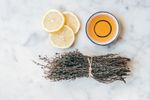If you've tested positive — or you have symptoms but aren’t able to get tested yet — a top functional medicine doctor shares what to do.
As the number of COVID-19 cases across the United States continues to grow (with more than 50,000 cases reported at the time of this writing), emergency rooms are becoming overwhelmed. According to current CDC guidelines, mild cases (any case that doesn’t require hospitalization) should be managed at home and hospitals should be reserved for critically ill patients.
If you are experiencing mild symptoms, stay home in order to decrease the likelihood of transmission, and call a medical professional for advice on how to proceed. If necessary, take acetaminophen (Tylenol) to manage a fever and body aches, but avoid ibuprofen, aspirin and other NSAIDs.
NOTE: If you develop emergency warning signs for COVID-19, seek medical attention immediately. Emergency warning signs include, but are not limited to:
- Trouble breathing
- Persistent pain or pressure in the chest
- New confusion or inability to arouse
- Bluish lips or face
In lieu of serious symptoms, here’s what you can do to support your body in fighting and recovering from the virus.
1 Get More Sleep
Your immune system works optimally when you are in a state of rest. So, give it the rest it needs! Make sure you take naps throughout the day and get plenty of sleep at night.
One symptom of COVID-19 is extreme fatigue. Do not push your body. If walking to your kitchen for a glass of water makes you want to go to sleep for the rest of the afternoon, that’s totally fine! Listen to your body — if you feel tired, stay in bed.
To improve the quality of your shuteye, considering taking 3mg of melatonin around 9pm. Also, avoid screen time after 11pm and bypass caffeine after 4pm, including green tea.
Find more tips on improving the quality of your sleep here.
2 Manage Stress
No doubt this is a stressful time — and sickness can intensify the impact stress has on your body. Make time to manage your response with techniques such as meditation and consider taking a supplement that will support you through this angst-filled period. Try 400mg of magnesium once per day, adaptogenic herbs (like Ashwaganda or Rhodiola) or sedative herbs (such as Kava Forte or CBD).
Also, get your mind off thoughts of the virus by watching funny movies, and take breaks from social media — focusing on post after post of quarantine updates or coronavirus news just fuels unsettling feelings.
3 Drink Plenty of Fluids
If you are running a fever (body temperature above 99.0 degrees Fahrenheit), that means your body is losing increased amounts of fluid in an attempt to cool off. To supplement the fluids you’re losing, drink half of your bodyweight in ounces of fluids.
A good indicator of adequate hydration is your rate of urination. If you are not urinating frequently (at least five times per day), you are dehydrated. Hydration is even more important than food, especially if you are sick.
For a hydrating and healing drink, chop up a piece of peeled fresh ginger, steep it in hot water and add the juice of a whole lemon per cup of water. Add 1 teaspoon of turmeric and 1/2 teaspoon of honey once the mixture is lukewarm. Drink one cup three times per day.
4 Eat Healing Foods
Soups or warm, cooked dishes are nourishing and easy on your throat and stomach, especially when you don’t have much of an appetite. I advise getting a few cartons of chicken stock or ordering from a bone-broth supplier that can deliver to you.
If you're not hungry, it’s fine to fast for a day, but again, continue to hydrate sufficiently. When you do want to eat, I advise adding garlic, onions, apples, tomatoes, nuts, berries, parsley and celery into your diet. These vegetables and fruits have phytonutrients — like the powerful antioxidants quercetin and rutin and other antimicrobial compounds — that support your innate immune system's ability to battle microbes.
For more immunity-boosting ingredients, read this.
5 Supplement With Vitamins and Minerals
Giving your body key supplements is also extremely important when you are battling Covid-19. I suggest the following:
- Zinc: 30 to 50 mg per day (It can cause nausea, so take it with food.). If you can't get your hands on the supplement, these food sources are rich in zinc:
- Oysters
- Ground beef
- Alaskan king crab
- Cooked lobster
- Vitamin D: 5,000 IUs per day. (Ideally, you would have your level checked and keep the blood level between 50-80 ng/mL).
- N-Acetyl Cysteine (NAC): 600- 800 mg twice a day. It protects the lungs and supports the production of the master antioxidant glutathione in the body.
- Glutathione. Have it handy and start using it only when you feel you are getting sick. Take 400mg 1-5 times per day. It will help your immune system function optimally.
- Vitamin A: 5,000 IUS per day.
- Vitamin C: 500 mg every 1 to 2 hours with big glass of water




